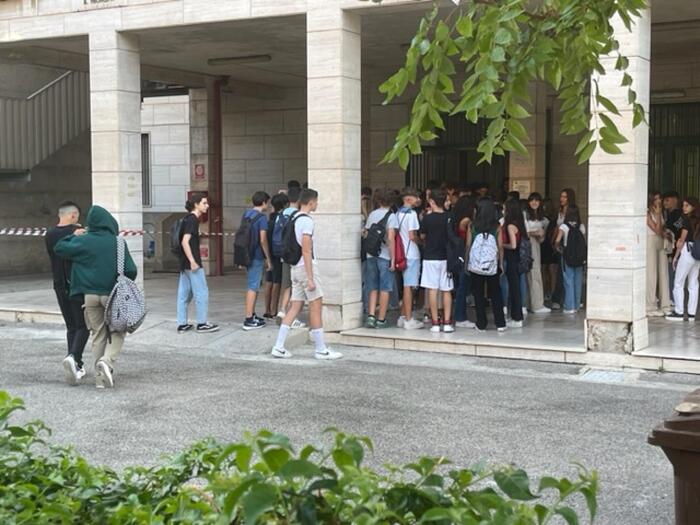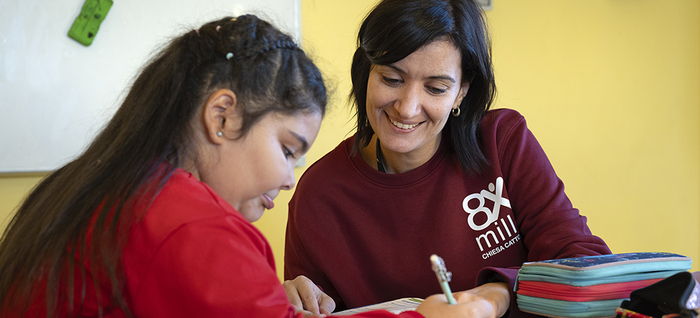Javier Firpo
02/15/2020 - 17:48
- Clarín.com
- Society
It will no longer be an obligation to present the regular student certificate to collect the school assignment, the government confirmed on Monday. The aid that will be charged between March and April in any case and the obligation was relaxed and now this document can be delivered until December 31.
The school assignment is a benefit so that families with children between 4 and 17 can collect the 2020 school aid , which the ANSES pays each year. According to a regulation that had been approved last August, to access this assistance for each schoolboy, the certificate of schooling had to be presented before December 31 of the previous year.
As Clarín reported on Monday, Resolution No. 28, published in the Official Gazette, repealed this regulation on the grounds that " depending on the emergency economic and social context and the imminent start of the school year , it is necessary to repeal the August modification of 2019, “in order to ensure that children and adolescents, who present the corresponding certificate until December 31, receive in bulk, at the beginning of the school year, the Assignment for School Aid ”.
School aid is a fixed and annual sum, which ranges between 2,300 pesos and 4,590 pesos per child , depending on whether the area is more or less unfavorable. In any case, the amount must be updated and will be paid to one of the parents of the children and adolescents attending educational establishments incorporated into official education.
This provision of the ANSES generated much rejection in society, which manifested itself in social networks, and also in the political arc. Since the opposition, the national deputy Luis Petri requested to cancel the measure provided by resolution 28/20. "There is no tool that generates more social mobility than education. The decision will have a negative impact and will cause more school dropout ."
The debate invited to consult different specialists about their opinion and if this measure could generate, or not, greater school absenteeism. "Based on rigorous studies, we found that taking the regular student certificate is not directly related to whether or not the boy attends school , so it does not seem like a bad measure," says José Florito, Social Protection Coordinator of Cippec (Center for the Implementation of Public Policies for Equity and Growth).
That conclusion is not premature for Florito "since we warn that the family decides to take the boy to school because of the income effect, not because of the obligation to carry the certificate . In other words, for vulnerable families the possibility or impossibility of taking their children children to school is due to the income effect ".
"But there is a resounding on the part of the middle and upper classes, which tend to stigmatize the poor, speculating that the place is squandered on drugs or slippers ... A discourse of class hatred, very installed in certain sectors , but not It has a correlation with reality, "says the Bachelor of Political Science.
From Cippec, Florito is recommended to try to reduce the bureaucratic burdens that demand the management of this type of certificates . "We are talking about very diverse families, many who live in rural or peripheral areas, with little access to health and education, so taking a day to obtain that document, paying the ticket, finding the right person, implies a loss of the work day, so it would be important to think of a more automatic scheme for such procedures . "
In contrast, Guillermina Tiramonti, an Education specialist and researcher at FLACSO, is blunt: " The decision of the government does not seem positive or encouraging , because I am convinced that parents have the obligation to send their children to school. whatever the situation of each family was. Not because they are poor, they are exempt from the obligation to attend classes , in addition to being the most needy to go to school. "
For Tiramonti, the non-obligation of delivering the regular student certificate is attentive not only against presentism "but also with the feeling that the school is not important . Attempts against the assessment of the school institution, it seems to me a measure that puts in check that valuation, that is to say that it is a devaluation , plain and simple. The school cannot be ruled out as well as vaccines . Boys have to grow up healthy and educated. "
Tiramonti believes that the school subsidy should not run the risk of those who do not attend classes "depending on the reasons". But it must be the State "who should keep track of why the boy does not attend, why he does not have the certificate, since many times the problem is not absent but from the school, which does not provide the corresponding document. But it is key control and the requirement to parents to send the children to school because, in that case there is no reason to justify it, the subsidy will be taken away. "
Specialist in social inclusion and economist, Sebastián Waisgrais believes that "it is a complex issue both because of the current economic situation and because of the proximity of the beginning of the school year. And it must also be taken into account that it is an extension, not a exemption from the presentation of the certificate ".
On the other hand, for Waisgrais, who works for UNICEF, "there is one more substantive issue, which has to do with the fact that in the last year, for example, there were thousands of boys who did not present the school certificate, but not because of absenteeism or desertion , but due to difficulties related to households in poverty, long distances from ANSES offices, complications to access the internet, so the information is not always available or simply because they ignore that they have to present this certificate, which implies that they run the risk of losing the assignment . "
Waisgrais asks and consults: " Whose responsibility is it, the family, or the ANSES and the Education System , which is not clear enough when communicating?" Finally, the economist feels that "it is a positive measure within the current context, but it is necessary to improve the information and discuss the meaning of this certificate and analyze if it does not end up resulting in an additional exclusion factor ."
Director of the School of Educational Management, Gustavo Iaies had expressed days ago about this measure and made clear discomfort and disagreement. " Removing the obligation of schooling sounds like surrender . To stop demanding of the boys to go to school is to abandon the pressure, it is to allow them to stop fighting for a better future , for themselves."
Specialist in educational matters, Iaies feels that "it is likely that many children leave school when their parents do not feel obliged to take them. Giving in to the obligation does not help them, they need fathers and mothers who demand them, not to let them fall from school , push them to a better future. "
"The future is not what is going to happen but what we are going to do," Iaies reminded Jorge Luis Borges. "It is not abandoning us, it is fighting to overcome ourselves. We need to own our future, have goals and bet on achieving them," says the former school principal and with a Master in Education. " This society cannot afford to lower the barriers, we cannot accept to be less , we need to work in an effort to overcome, to improve. We have been falling, the only way to stop this happening is to look forward."
GS







